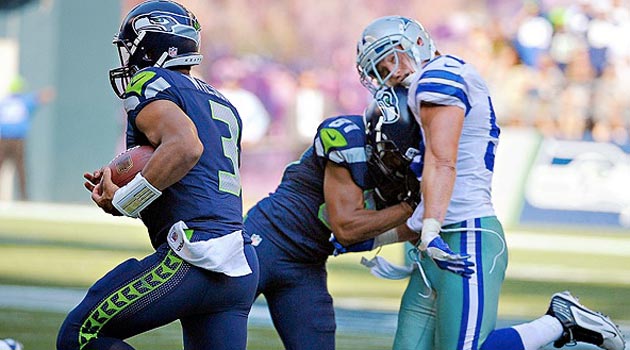On November 1st, 2015, Seattle Seahawks receiver Ricardo Lockette suffered a career-ending injury in Dallas. A big hit from Cowboys safety Jeff Heath led to severe neck damage.
Yesterday, Lockette wrote a fabulous piece in The Players’ Tribune about the injury and his subsequent retirement. Every football fan should take a moment to read it, because it gives the game we love some oft-needed perspective.
We should never lose sight of the tremendous risk that these players take on for our entertainment.
 Yes, they are well-paid for that risk. But as Lockette put it so well in his article, it’s all “temporary.” Especially in the NFL where contracts aren’t fully guaranteed, the timing of an injury can be just as financially devastating as the physical damage.
Yes, they are well-paid for that risk. But as Lockette put it so well in his article, it’s all “temporary.” Especially in the NFL where contracts aren’t fully guaranteed, the timing of an injury can be just as financially devastating as the physical damage.
Players can be left in tremendous debt, having taken on luxuries and expenses that they thought would be covered by many more years of football income. They may have spent their first windfall rewarding family and friends for years of support, leaving little for their own future security. It’s a common mistake, hence why the term “broke athlete” has been covered in several documentaries and other media.
The lifetime of physical problems that comes from football can’t be forgotten, either. Even those who avoid major injury face early onsets of everything from severe arthritis to ruinous dementia. Imagine turning 40 but having the body of a 60-year-old. That’s the price for many of these athletes.
Obviously, I don’t know anything about the future of Lockette’s finances or personal health. All I know is that he’s paying a far heavier toll for being a football player than any guy ever should.
Cowboy or not, we should never stop appreciating these players. All the money doesn’t exist without us, the consumer, and our ongoing desire to watch and follow the NFL. Ultimately we have the power in the relationship; all professional sports would die without the buying and viewing support of the spectators.
It’s easy to get jaded about players’ motivations. Just always remember that they wouldn’t have a choice without you.
 Violence and Football
Violence and Football
The word “violence” comes up in football a lot. Some detractors use it as a form of moral judgment; an activity that spits in the face of human decency.
I’ve never felt that way about the game. Yes, it’s violent, but I see it in the way that a windstorm or other natural force is violent. For all its destructive potential, the windstorm isn’t looking to hurt anyone. It simply is, and you can either risk getting close or do your best to avoid it.
Granted, there are plenty of violent men in the NFL. Without even getting into some well known off-field issues, the sport itself gives violent individuals an outlet for those feelings. There’s no question that notorious villains like Bill Romanowski or Ndamukong Suh have their issues.
Cowboys safety Jeff Heath isn’t one of those guys. Heath wasn’t looking to hurt anybody that day against the Seahawks. He was just playing football.
Sadly, Ricardo Lockette got caught in the windstorm.
The modern climate of concussions and CTE concerns has already changed the way many look at football. Drops in Pee Wee and public school participation have been reported. Even some current and retired NFL players have said they won’t allow their own children to play.
I have no doubt, at least in my lifetime, that football will still exist. There will always be more than enough players willing to take risk. More importantly, there will always be a ready and willing audience.
My hope is that, no matter how insatiably we hunger for games to watch and fantasy stats to track, we as fans never lose sight of the risks the players take. I don’t see it as a moral dilemma, but it is a situation that demands our respect and consideration.
 I will never forget that October game in 1999 in Philadelphia, when Cowboys legend Michael Irvin went down with a neck injury and never returned. The Eagles fans, who are often the height of classlessness, cheered his injury even when it was clearly serious. To this day it remains the most disgusted I’ve ever been watching football.
I will never forget that October game in 1999 in Philadelphia, when Cowboys legend Michael Irvin went down with a neck injury and never returned. The Eagles fans, who are often the height of classlessness, cheered his injury even when it was clearly serious. To this day it remains the most disgusted I’ve ever been watching football.
That is when the moral judgment can come into play. That’s when the violence becomes something more sinister; our reaction to and delight in it. Again, we as the audience dictate the terms of the relationship.
I’m not trying to soapbox you here. But reading Ricardo Lockette’s piece made me think about my own relationship with football. It was a good check for how I think and feel about the players I watch, and especially those on the 31 other teams outside of Dallas.
As the 2016 season draws near, it’s a welcome reminder. We hear this often when it comes to players but we as fans need to be under the same obligation.
Respect the game.

Great stuff, Jess. The game we all love can turn so very scary in an instant.
Thanks, Kevin. That's probably part of we find it all so thrilling; the ever-present potential for disaster.